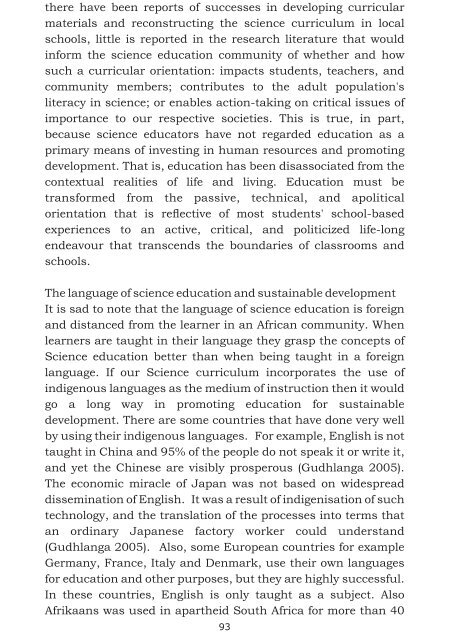Beneficiaries are actors too.pdf - Southern Institute of Peace ...
Beneficiaries are actors too.pdf - Southern Institute of Peace ...
Beneficiaries are actors too.pdf - Southern Institute of Peace ...
Create successful ePaper yourself
Turn your PDF publications into a flip-book with our unique Google optimized e-Paper software.
there have been reports <strong>of</strong> successes in developing curricular<br />
materials and reconstructing the science curriculum in local<br />
schools, little is reported in the research literature that would<br />
inform the science education community <strong>of</strong> whether and how<br />
such a curricular orientation: impacts students, teachers, and<br />
community members; contributes to the adult population's<br />
literacy in science; or enables action-taking on critical issues <strong>of</strong><br />
importance to our respective societies. This is true, in part,<br />
because science educators have not regarded education as a<br />
primary means <strong>of</strong> investing in human resources and promoting<br />
development. That is, education has been disassociated from the<br />
contextual realities <strong>of</strong> life and living. Education must be<br />
transformed from the passive, technical, and apolitical<br />
orientation that is reflective <strong>of</strong> most students' school-based<br />
experiences to an active, critical, and politicized life-long<br />
endeavour that transcends the boundaries <strong>of</strong> classrooms and<br />
schools.<br />
The language <strong>of</strong> science education and sustainable development<br />
It is sad to note that the language <strong>of</strong> science education is foreign<br />
and distanced from the learner in an African community. When<br />
learners <strong>are</strong> taught in their language they grasp the concepts <strong>of</strong><br />
Science education better than when being taught in a foreign<br />
language. If our Science curriculum incorporates the use <strong>of</strong><br />
indigenous languages as the medium <strong>of</strong> instruction then it would<br />
go a long way in promoting education for sustainable<br />
development. There <strong>are</strong> some countries that have done very well<br />
by using their indigenous languages. For example, English is not<br />
taught in China and 95% <strong>of</strong> the people do not speak it or write it,<br />
and yet the Chinese <strong>are</strong> visibly prosperous (Gudhlanga 2005).<br />
The economic miracle <strong>of</strong> Japan was not based on widespread<br />
dissemination <strong>of</strong> English. It was a result <strong>of</strong> indigenisation <strong>of</strong> such<br />
technology, and the translation <strong>of</strong> the processes into terms that<br />
an ordinary Japanese factory worker could understand<br />
(Gudhlanga 2005). Also, some European countries for example<br />
Germany, France, Italy and Denmark, use their own languages<br />
for education and other purposes, but they <strong>are</strong> highly successful.<br />
In these countries, English is only taught as a subject. Also<br />
Afrikaans was used in apartheid South Africa for more than 40<br />
93


